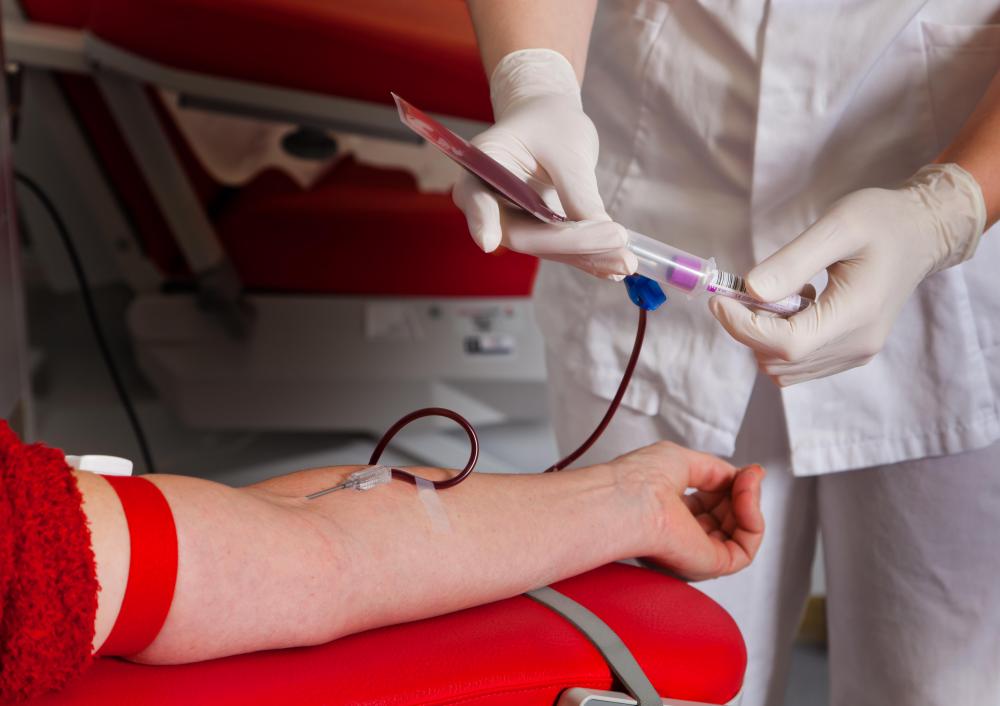At WiseGEEK, we're committed to delivering accurate, trustworthy information. Our expert-authored content is rigorously fact-checked and sourced from credible authorities. Discover how we uphold the highest standards in providing you with reliable knowledge.
What are the Symptoms of Iron Deficiency Anemia?
Iron deficiency is the most common cause of anemia. Deficiency in iron causes anemia because iron is required to form a protein called hemoglobin, which is responsible for transporting oxygen in the bloodstream. Common symptoms of iron deficiency anemia include fatigue and pale skin. More serious symptoms of this type of anemia can include an enlarged spleen and an increased heart rate.
Iron deficiency anemia has a number of possible causes. A low-iron diet is a common cause. Anemia can even develop despite a high-iron diet, because certain gastrointestinal tract diseases or abnormalities can reduce the amount of iron that can be absorbed from food.

Most iron in the body is stored in hemoglobin, and about one-third is stored in other forms in the liver, spleen and bone marrow. With most iron stored in the blood, extreme or rapid blood loss can cause iron deficiency anemia. Gastrointestinal bleeding, traumatic injury and, occasionally, very heavy or prolonged menstrual bleeding all can lead to symptoms of iron deficiency anemia.

The most common symptoms are pale skin and fatigue, and other possible symptoms include irritability, swollen tongue and spleen enlargement. Sometimes, people with iron deficiency anemia have cravings for unusual substances such as dirt and ice. If the heart becomes affected by anemia, possible symptoms can include arrhythmia, a heart murmur or unusual heartbeat sound and even heart failure. People with iron deficiency anemia also have an increased risk of infection and have a tendency to develop restless leg syndrome. This condition causes discomfort in the legs, accompanied by a strong desire to constantly move the legs.

Most of these symptoms of iron deficiency anemia develop because iron deficiency leads to reduced iron-carrying hemoglobin in the bloodstream. Reduced availability of hemoglobin means that there is less oxygen in the blood. Reduced oxygen availability leads to fatigue and irritability, and pale skin develops because oxygenated hemoglobin gives blood its deep red color. When the amount of hemoglobin is reduced, this red color is diluted.

Heart problems can develop as a result of iron deficiency anemia because the heart must pump harder to circulate oxygen within the body. When the heart is forced to pump harder, a more rapid heartbeat is a common consequence. Chronic anemia can lead to heart failure because the extra work that the heart is forced to do eventually causes it to weaken.

Many symptoms of iron deficiency anemia are non-specific, which means that they also are symptoms of other medical conditions. For this reason, a diagnosis of iron deficiency anemia is confirmed with blood tests to determine blood iron levels. In addition, other tests might be required to determine the cause of the anemia.
AS FEATURED ON:
AS FEATURED ON:

















Discussion Comments
The major symptom I had when I found out about my anemia diagnosis and iron deficiency was fainting. I was fainting twice, sometimes three times a week. I had a blood test done and my iron levels turned out to be extremely low. In fact, my doctor said that it was the lowest he has seen.
I'm okay now though. I'm taking iron regularly. Sometimes I do feel tired but it passes quickly. As for the paleness, I always have it. That doesn't seem to go away no matter what.
@turquoise-- Yep, craving weird things like dirt, ice, salt and raw meat are symptoms of iron deficient anemia. I think the medical term for craving non-food items is "pica." Some of these things actually have iron, but some don't. Doctors can't really explain why people with anemia crave ice for example. Some say that it has to do with lack of oxygen in the body because ice does not have iron. Meat on the other hand does have iron.
My roommate has an iron deficiency. She is always craving ice and now I know that it's an anemia sign. I thought it was so weird that she would eat ice sometimes. She told me that she has a craving for it.
Sometimes she forgets to take her iron supplements. I find her supplement on the kitchen table. She takes it out to take it and then forgets it. I'm going to remind her about it more often. I didn't realize that an iron deficiency can be such a serious condition.
Post your comments